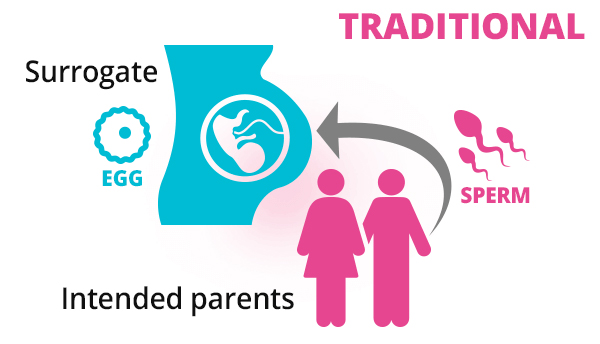Surrogacy is a complex and sensitive topic that includes legitimate, moral, and profound contemplations. Traditional surrogacy, a technique where the surrogate mother is hereditarily connected with the kid she conveys, raises extraordinary lawful and social issues. In India, surrogacy has been a subject of huge discussion, prompting the foundation of legitimate structures to manage the training. This article dives into the legitimate parts of traditional surrogacy in India, exploring the current laws, regulations, and ethical considerations surrounding this form of assisted reproduction.

Understanding Traditional Surrogacy
Contents
Traditional surrogacy is a strategy for helped proliferation where the surrogate mother is hereditarily connected with the kid she conveys. In this cycle, the substitute’s egg is prepared with the planned dad’s sperm through managed impregnation. Subsequently, the surrogate becomes both the gestational and hereditary mother of the kid. Traditional surrogacy has one of a kind legitimate and moral ramifications, and its training is directed by unambiguous regulations in various nations. It remains a topic of ongoing debates and discussions in the field of reproductive medicine.
Historical Perspective and Evolution of Surrogacy in India
Surrogacy, a strategy for helped generation, has a long history, with references tracing all the way back to old developments. However, the commercialization and formalization of surrogacy as an operation are moderately late turns of events. In India, surrogacy acquired noticeable quality in the late twentieth 100 years, developing through various stages to reach its current legal framework.
- Early Beginnings: The concept of surrogacy can be traced back to ancient times when it was practiced informally in different cultures. Records from ancient Egypt, Greece, and Rome mention surrogate mothers carrying children for infertile couples. However, these practices were not structured or regulated as they are today.
- Emergence in the Modern Era: The formalization of surrogacy as a medical procedure began in the 20th century, primarily in response to the increasing cases of infertility. India, like many other countries, witnessed a rise in demand for fertility treatments. As advancements in medical technology and assisted reproductive techniques progressed, surrogacy emerged as a viable option for infertile couples.
- India as a Surrogacy Hub: In the early 2000s, India emerged as a prominent destination for surrogacy services, attracting international couples seeking affordable and accessible fertility treatments. The combination of skilled medical professionals, comparatively lower costs, and a relatively relaxed regulatory environment made India a favored choice for international surrogacy.
- Legal Vacuum and Ethical Concerns: The growing popularity of surrogacy in India also gave rise to several ethical and legal concerns. The lack of comprehensive laws and regulations led to instances of exploitation of surrogate mothers and discrepancies in agreements. The ethical implications of commercial surrogacy, especially in the context of traditional surrogacy where the surrogate is genetically related to the child, sparked intense debates.
- The Indian Council of Medical Research (ICMR) Guidelines: In 2005, the Indian Council of Medical Research (ICMR) issued guidelines to regulate assisted reproductive technologies, including surrogacy. These guidelines aimed to safeguard the rights and health of surrogate mothers and ensure ethical practices in surrogacy arrangements. However, they were non-binding, leading to inconsistencies in their implementation.
- The Assisted Reproductive Technology (ART) Bill: In 2010, the Indian government introduced the Assisted Reproductive Technology (ART) Bill to address the complexities of surrogacy and other fertility treatments. The bill aimed to regulate assisted reproduction, including the establishment of a National Registry and accreditation of fertility clinics. However, it remained pending and faced several revisions over the years.
- The Surrogacy (Regulation) Bill, 2019: In 2019, the Indian government presented the Surrogacy (Guideline) Bill to manage surrogacy exhaustively. The bill proposed a total restriction on business surrogacy, permitting just benevolent surrogacy for Indian residents. Also, it characterized the qualification standards for planned parents and surrogate mothers, seeking to protect the interests of all parties involved.
In general, The historical perspective of surrogacy in India reflects the evolution of the training from casual plans to a formalized operation. The excursion has been set apart by progressions in clinical innovation, a flood popular for fertility treatments, moral problems, and endeavors at administrative systems. The presentation of the Surrogacy (Guideline) Bill in 2019 signs the public authority’s endeavors to address the intricacies encompassing surrogacy and give a thorough legitimate system to helped propagation. As India explores the legitimate and moral scene of surrogacy, it remains essential to strike a balance between safeguarding the rights of surrogate mothers and providing infertile couples with a path to parenthood.

The Legal Framework of Surrogacy in India
Surrogacy in India has undergone significant changes throughout the long term, with the Indian government carrying out lawful structures to direct and administer the training. The legitimate scene encompassing surrogacy expects to safeguard the interests of surrogate mothers, intended parents, and the kid brought into the world through helped multiplication. As a result, there have been numerous official advancements tending to surrogacy, including the Helped Assisted Reproductive Technology (ART) Bill and the Surrogacy (Guideline) Bill, 2019.
Assisted Reproductive Technology (ART) Bill
The ART Bill was introduced in 2010 to address various aspects of assisted reproductive technologies, including surrogacy. This bill planned to lay out a public administrative structure for the administration and management of fertility clinics and helped proliferation systems. While the Workmanship Bill resolved a few significant issues connected with the security and privileges of surrogates, it remained in a draft form and was not enacted into law.
The Surrogacy (Regulation) Bill, 2019
In an effort to regulate surrogacy more comprehensively, the Indian government presented the Surrogacy (Guideline) Bill, 2019. This bill looked to supplant and annul the current Workmanship Bill while giving point by point arrangements well defined for surrogacy plans. The fundamental targets of the Surrogacy Bill were:
- Prohibition of Commercial Surrogacy: The Surrogacy Bill sought to prohibit commercial surrogacy, allowing only altruistic surrogacy arrangements. In altruistic surrogacy, the surrogate mother does not receive financial compensation beyond medical expenses and insurance coverage.
- Eligibility Criteria for Intended Parents: The bill outlined eligibility criteria for intended parents, including a minimum of five years of marriage, and a certificate of infertility from a government-appointed medical board.
- Age and Consent of Surrogate Mothers: The Surrogacy Bill stipulated that surrogate mothers should be married and have at least one biological child of their own. They should also fall within the age range of 25 to 35 years and provide written consent for surrogacy.
- Establishment of National Surrogacy Board and State Surrogacy Boards: The bill proposed the establishment of a National Surrogacy Board and State Surrogacy Boards to oversee surrogacy procedures and ensure compliance with the law.
- Rights and Obligations: The Surrogacy Bill outlined the rights and obligations of the surrogate mother, intended parents, and the child born through surrogacy. It sought to safeguard the interests of all parties involved.
- Penalty for Violation: The bill prescribed penalties for any contraventions of its provisions, aiming to deter illegal and unethical practices related to surrogacy.
However, the Surrogacy (Guideline) Bill, 2019, raised a few worries and reactions. One notable concern was the avoidance of specific gatherings, for example, single parents and same-sex couples, from profiting surrogacy administrations.
Current Status and Ongoing Discussions
As of 2023, the Surrogacy (Regulation) Bill, 2019, is yet to be authorized into regulation. It has been a subject of progressing conversations and discussions, with partners offering changed viewpoints on its arrangements. The Indian government and policymakers keep on thinking on the best way to deal with directing surrogacy while thinking about the privileges and interests of every single included party.
In Additions, the lawful system of surrogacy in India has seen critical turns of events, with the introduction of the ART Bill and the Surrogacy (Regulation) Bill, 2019. These administrative drives expect to oversee the act of surrogacy, safeguard the privileges of substitute moms, planned guardians, and the youngster, and advance moral and benevolent surrogacy courses of action. As conversations proceed, it is vital for figure out some kind of harmony among guidelines and individual privileges to guarantee a fair and strong environment for surrogacy in India.

Traditional Surrogacy Contracts and Legal Considerations
Traditional surrogacy involves unique legal considerations due to the genetic connection between the substitute mother and the kid she conveys. In India, traditional surrogacy contracts are drafted to lay out the freedoms as well as certain limitations of all gatherings included, to be specific the surrogate mother, planned guardians, and any outsider organizations working with the surrogacy course of action. We should investigate the critical components of conventional surrogacy arrangements and the legitimate contemplations related with them.
Key Elements of Traditional Surrogacy Agreements
Traditional surrogacy contracts are exhaustive authoritative archives that frame the agreements of the surrogacy plan. The key components normally included in these agreements are:
Consent and Acknowledgment: The contract should clearly state that all parties involved have given informed consent to the surrogacy arrangement. This ensures that the surrogate mother fully understands the process and willingly agrees to participate.
Genetic Connection: Unlike gestational surrogacy, where the surrogate has no genetic relationship with the child, traditional surrogacy involves a genetic connection. The contract should explicitly address this aspect and clarify that the child will be biologically related to the surrogate mother.
Financial Arrangements: The contract should outline the financial terms, including compensation to the surrogate mother for her time, effort, and expenses related to the pregnancy. The amount and method of payment should be clearly specified.
Medical Procedures and Care: The contract should detail the medical procedures involved in the surrogacy process, including artificial insemination and prenatal care. It should also define the responsibility for medical expenses and any potential complications during the pregnancy.
Parental Rights and Responsibilities: The contract should address the intended parents’ parental rights and responsibilities, stating that they will assume legal custody of the child upon birth and be responsible for the child’s welfare.
Confidentiality and Privacy: To protect the privacy and identity of all parties involved, the contract may include confidentiality clauses, restricting the disclosure of personal information.
Rights and Obligations of the Surrogate Mother and Intended Parents
In a traditional surrogacy contract, the surrogate mother’s rights and obligations are clearly defined. She has the privilege to arrive at conclusions about her wellbeing and the pregnancy, and her prosperity ought to be focused on in the interim. The intended parents, then again, reserve the option to authority of the kid and are committed to offer monetary help and care for the surrogate mother during the pregnancy.
Dispute Resolution Mechanisms
The contract should establish dispute resolution mechanisms in case of disagreements or conflicts between the parties. This may involve mediation or arbitration to resolve issues amicably and avoid legal disputes.
- Legal Considerations: Creating a well-drafted traditional surrogacy contract is significant to safeguard the privileges and interests of all gatherings included. Legitimate experts experienced in surrogacy regulation ought to survey and draft the agreement to guarantee its legitimacy and enforceability. Also, consistence with neighborhood and public regulations and guidelines connected with surrogacy is fundamental to stay away from possible legal complications.
Generally, Traditional surrogacy contracts play a pivotal role in defining the terms of the surrogacy arrangement and safeguarding the rights of surrogate mothers and intended parents. These lawfully official arrangements advance straightforwardness, clearness, and common comprehension among all gatherings included, adding to a fruitful and agreeable surrogacy journey. In any case, it is significant to move toward traditional surrogacy contracts with compassion, regard, and consideration for the emotional complexities that may arise during this deeply personal experience.

Ethical Implications of Traditional Surrogacy
Traditional surrogacy, wherein the surrogate mother is genetically related to the child she carries, raises a few moral contemplations that request insightful examination. While the training offers expect hopeful parents and a chance for surrogate mothers to help other people, it likewise presents complex moral issues that warrant consideration.
Genetic Connection: The most significant ethical concern in traditional surrogacy is the genetic connection between the surrogate mother and the child. This intimate link can raise emotional and psychological challenges for all parties involved. It may lead to complex emotions for the surrogate mother, who may feel a strong attachment to the child during pregnancy, potentially affecting her decision-making process post-birth.
Autonomy and Consent: Ensuring the informed consent and autonomy of the surrogate mother is crucial in traditional surrogacy. Ethical considerations revolve around whether the surrogate mother fully comprehends the implications of her decision to carry a child genetically related to her. It is imperative to provide comprehensive counseling and support to the surrogate mother throughout the process to ensure her well-being and informed decision-making.
Exploitation and Vulnerability: Ethical concerns arise when there is a significant power imbalance between the intended parents and the surrogate mother, especially in cases of financial disparities. There is a risk of exploitation if the surrogate mother’s economic circumstances lead her to enter into surrogacy out of financial necessity. Protecting the surrogate mother from potential exploitation is crucial to uphold ethical standards.
Parental Rights and Responsibilities: Traditional surrogacy can create ambiguous parental roles and responsibilities. The genetic link between the surrogate mother and the child may challenge the intended parents’ legal and emotional connection to the child, leading to complex legal and ethical dilemmas.
Social Stigma and Cultural Perceptions: Ethical implications extend beyond individual experiences to broader social and cultural attitudes towards surrogacy. Traditional surrogacy may face more significant resistance and stigma in certain societies due to the genetic connection, influencing the acceptance and perceptions of the practice.
Addressing these ethical considerations requires a comprehensive approach that includes partners, including medical care experts, legitimate specialists, expected parents, and surrogate mothers. Ensuring the well-being and independence of substitute moms, laying out clear lawful systems, and advancing straightforward correspondence among all gatherings can assist with exploring the moral intricacies of customary surrogacy. Moreover, encouraging a merciful and steady climate is vital for regard the privileges and respect of all people involved in the surrogacy process.

Case Studies and Landmark Judgments
Over the years, traditional surrogacy in India has been the subject of several legal cases and landmark decisions that have formed the legitimate scene and moral contemplations encompassing surrogacy. These cases have tended to different parts of traditional surrogacy, including the expectations of substitute moms and planned guardians. Here are some eminent contextual analyses and milestone decisions in the context of traditional surrogacy in India:
Baby Manji Yamada Case: In 2008, the case of Baby Manji Yamada gained international attention and brought the legal complexities of traditional surrogacy to the forefront. Baby Manji, conceived through traditional surrogacy, was left stateless when her intended parents divorced before her birth. The case involved questions about citizenship, parental rights, and the welfare of the child. The Supreme Court of India intervened and ensured that Baby Manji received a passport and was allowed to leave the country with her grandmother.
Jan Balaz v. Union of India Case: The Jan Balaz case, in 2011, dealt with the issue of nationality for a child born through traditional surrogacy. The Czech couple, Jan Balaz and Susanne Bernhard Balaz, had twin children born to an Indian surrogate mother. The Indian government initially refused to grant citizenship to one of the twins, claiming that only the genetic parent could be considered the parent. However, the Supreme Court of India ruled in favor of granting Indian citizenship to both children, highlighting the significance of the child’s welfare and the right to a nationality.
M.M. Healthcare v. State of Rajasthan Case: In this 2013 case, the Rajasthan High Court addressed the legality of commercial surrogacy arrangements in India, including traditional surrogacy. The court upheld the legality of commercial surrogacy, subject to compliance with the guidelines issued by the Indian Council of Medical Research (ICMR). The judgment emphasized the importance of protecting the interests of surrogate mothers and ensuring that surrogacy agreements are in line with ethical considerations.
Janani Suraksha Yojana and Surrogacy: The implementation of the Janani Suraksha Yojana (JSY) – a government scheme aimed at promoting institutional deliveries and reducing maternal and infant mortality – has sparked debates about its impact on traditional surrogacy. Critics argue that JSY’s incentives may incentivize vulnerable women to engage in surrogacy as a means of financial gain, raising concerns about exploitation and informed consent.
These case studies and landmark judgments have contributed to the continuous conversations and guidelines encompassing conventional surrogacy in India. They have highlighted the requirement for a powerful legitimate system that safeguards the freedoms of surrogate mothers, shields the government assistance of youngsters brought into the world through surrogacy, and maintains moral guidelines in helped propagation. As surrogacy regulations keep on advancing, these legal precedents will remain crucial in shaping the future of traditional surrogacy in India.

The Future of Traditional Surrogacy in India
The future of traditional surrogacy in India remains uncertain, as the nation wrestles with different lawful, moral, and social ramifications encompassing helped propagation. While India has put forth attempts to manage surrogacy through the Helped Assisted Reproductive Technology (ART) Bill and the Surrogacy (Guideline) Bill, 2019, there are as yet progressing discussions and conversations with respect to the act of traditional surrogacy.
- Changing Legal Landscape: The Surrogacy (Guideline) Bill, 2019, which tries to supplant the current ART Bill, acquaints huge changes with the surrogacy structure in India. Starting around the last update in September 2021, the bill was under survey and dependent upon expected changes. The bill expects to limit business surrogacy, permit unselfish surrogacy for specific classifications of Indian residents, and lay out a National Surrogacy Board and State Surrogacy Boards for guideline and oversight. Assuming that the bill becomes regulation, it will fundamentally affect traditional surrogacy arrangements in India.
- Continued Debates and Discussions: The topic of surrogacy remains a subject of extensive debate in India, with stakeholders expressing diverse views on its ethical, legal, and social aspects. Some argue that traditional surrogacy, with the surrogate mother’s genetic connection to the child, raises complex emotional and ethical considerations. Others believe that traditional surrogacy can offer a unique and meaningful experience for all parties involved, including the surrogate mother, intended parents, and the child.
- International Perspectives: The global surrogacy landscape has also influenced discussions in India. Some countries have imposed restrictions or outright bans on surrogacy, leading to increased attention on India as a destination for surrogacy services. However, concerns have been raised about potential exploitation and lack of adequate legal safeguards for all parties involved. The Indian government is likely to consider these international perspectives while shaping the future of traditional surrogacy in the country.
- Focus on Ethical Considerations: The ethical implications of traditional surrogacy, particularly the genetic connection between the surrogate mother and the child, have prompted calls for careful consideration and examination. Ensuring the physical and emotional well-being of surrogate mothers, as well as protecting the rights of the child and intended parents, is a paramount concern. Any future regulations or amendments to surrogacy laws are likely to focus on striking a balance between these ethical considerations.
- Advancements in Assisted Reproduction: As technology and medical science continue to evolve, advancements in assisted reproductive techniques may influence the future of traditional surrogacy. Emerging technologies may offer alternative options or address some of the ethical concerns associated with traditional surrogacy.
Overall, The future of traditional surrogacy in India depends on a fragile harmony between the legitimate, moral, and social components of helped reproduction. The developing lawful scene, proceeded with discusses, international perspectives of view, and moral contemplations will all assume an essential part in molding the fate of surrogacy rehearses in the country. As India pushes ahead, it will be crucial for cultivate open exchange, draw in with different partners, and develop comprehensive regulations that prioritize the rights and well-being of all parties involved in traditional surrogacy arrangements.

Conclusion
Traditional surrogacy in India continues to be a subject of legal, ethical, and social contemplation. While the nation has laid out legitimate structures to direct surrogacy, the powerful idea of the training requires progressing conversations and likely regulative changes. As the world of assisted reproduction evolves, finding some kind of harmony between the privileges of substitute moms and planned guardians becomes foremost. The legal and ethical considerations surrounding traditional surrogacy in India call for continued dialogue, empathy, and a deep understanding of the diverse perspectives involved.
FAQ
1. What is traditional surrogacy, and is it legal in India?
Traditional surrogacy is a method where the surrogate mother is genetically related to the child she carries. As of the last update in September 2021, traditional surrogacy is legal in India under certain guidelines and regulations.
2. What are the legal provisions governing traditional surrogacy in India?
Traditional surrogacy in India is regulated by the Assisted Reproductive Technology (ART) Bill and the Surrogacy (Regulation) Bill, 2019. These bills outline the rights and responsibilities of the surrogate mother, intended parents, and the child.
3. Who can opt for traditional surrogacy in India?
The Surrogacy (Regulation) Bill, 2019, allows Indian citizens who have been married for at least five years and have proven infertility to opt for altruistic surrogacy. Foreign nationals, single individuals, and same-sex couples are not eligible for traditional surrogacy in India.
4. What are the eligibility criteria for becoming a surrogate mother in traditional surrogacy?
The surrogate mother must be a close relative of either the intended mother or the intended father, and she must have her own child to be eligible for traditional surrogacy in India.
5. What legal agreements are involved in traditional surrogacy arrangements?
Traditional surrogacy arrangements require a legally binding surrogacy agreement between the surrogate mother and the intended parents. The agreement must outline the rights and obligations of all parties involved.
6. What are the rights and responsibilities of the surrogate mother in traditional surrogacy?
The surrogate mother has the right to receive appropriate medical care and financial support during the pregnancy. However, she relinquishes all parental rights to the child.
7. What are the rights of the child born through traditional surrogacy?
The child born through traditional surrogacy is considered the legitimate child of the intended parents. The surrogate mother has no legal claim to the child, and the child inherits the property of the intended parents.
8. What are the legal steps involved in the traditional surrogacy process in India?
The traditional surrogacy process involves obtaining a medical certificate of infertility, signing a surrogacy agreement, and undergoing the surrogacy procedure at a registered and recognized fertility clinic.
Read Also:
- IVF Agency in India: Expert Fertility Solutions and Personalized Care
- Best Surrogacy Agency in India: Your Trusted Partner for Fulfilling Parenthood Dreams
- Surrogacy Agency in Mumbai: Guiding the Path to Parenthood
- Surrogacy Cost in Panchkula: Exploring Factors, Prices, and Options for Prospective Parents
- Surrogacy in Panchkula: Exploring the Top Surrogacy Services

